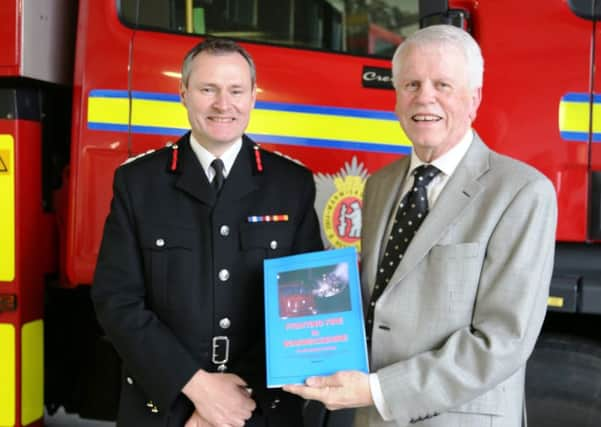Feature: a history of fighting fires in Warwickshire for more than 100 years


Fighting Fire in Warwickshire, by Stratford resident and author Mike Bunn, is an illustrated history of fire fighting in the county over the last 100 or so years.
It reveals details of the late 19th and early 20th century’s rural and town fire brigades, through the rapid pre-Second World War developments resulting in a nationalised fire service (NFS), to the present peacetime service we know today.
Advertisement
Hide AdAdvertisement
Hide AdThe book was launched by Mr Bunn – whose lifelong interest in the fire service was instigated by his uncles Ted and Stan who served in the part-time wartime fire services and later the peacetime retained service – and Warwickshire Chief Fire Officer Andy Hickmott at the service’s headquarters in Warwick Street, Leamington, last week.


Its launch deliberately coincided with the 70th anniversary of the provision of fire services by the county council in Warwickshire on April 1.
Mr Bunn said: “The book begins with two major chapters on fire service operations during the Coventry Blitz in November 1940 revealing the severe difficulties encountered by all local services.
“It highlights the confusion by distant government authorities attempting to organise a co-ordinated fire-fighting service with so many local brigades – all 1,440 of them – leading to the introduction of the NFS.
Advertisement
Hide AdAdvertisement
Hide Ad“It continues with a story of one local part-time NFS officer attempting to deal with the (apparent) stubborn bureaucracy of his bosses.


“The transfer of responsibilities to the new Warwick County Fire Brigade in 1948 was not without its complications including lack of capital for rebuilding and severe shortages of personnel.
“Gradually, through the 70 years covered by this book and overcoming some difficulties – not least reducing local authority finance – the county fire and rescue service has grown into a modern efficient organisation, albeit very different from that in 1948.”
Mr Bunn said he gathered information for the book from various sources including the Warwickshire County Record Office in Warwick, The Shakespeare Birthpace Trust in Stratford, county libraries and the fire service itself.
Advertisement
Hide AdAdvertisement
Hide AdA Warwickshire resident for more than 40 years, he previously published a guide for the Fire Museum in Essex – the county where he was born – and is a self confessed ‘trainspotter’ having had a long time interest in public transport
Talking about the launch, CFO Hickmott said: “We are pleased to the support the launch of this fascinating account of how the Warwickshire Fire and Rescue Service we see today came to be.
“There is so much more to the role of a modern firefighter than attending emergencies; our firefighters work with our communities and businesses to make Warwickshire a safer place.
“I hope this work helps to further tell the story of what the Fire and Rescue Service is and why it rightly remains one of the most highly regarded public services.”
Advertisement
Hide AdAdvertisement
Hide AdThe book is available for £17 from Warwick Books and Kenilworth books..
Alternatively email [email protected]
*** The first chapter of Mike Bunn’s Fighting Fire in Warwickshire covers the terrifying experience of Rugby Fire Brigade crews when they tackled the devastation of the Blitz on Coventry on and after November 14 1940.
It was about 7.10pm on that fateful night when the first red air raid warning was registered in Rugby’s occurrence book.
All entries on that night and for many following pages are dominated by red ink indicating air raid and/or fire calls.
Advertisement
Hide AdAdvertisement
Hide AdAbout 30 minutes later Birmingham Region Control rang the Chapel Street station to request a pump to go to Coventry headquarters.
The request was followed shortly after by a succession of calls denuding the station of fire pumps.
From the station watchtower, a glow had started to appear in the frosty night sky to the west – Coventry was being raided.
At 10.54pm Leamington Fire Brigade rang Rugby to say ‘no communications were coming out of Coventry’.
At 10.26am a exhausted crew returned to the station having been trapped under debris.